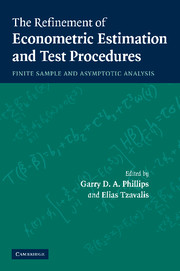Book contents
- Frontmatter
- Contents
- List of figures
- List of tables
- List of contributors
- Preface
- Acknowledgements
- Michael Magdalinos 1949–2002
- Introduction
- 1 Conditional Heteroskedasticity Models with Pearson Disturbances
- 2 The Instrumental Variables Method Revisited: On the Nature and Choice of Optimal Instruments
- 3 Nagar-Type Moment Approximations in Simultaneous Equation Models: Some Further Results
- 4 Local GEL Methods for Conditional Moment Restrictions
- 5 Limit Theory for Moderate Deviations From a Unit Root Under Weak Dependence
- 6 The Structure of Multiparameter Tests
- 7 Cornish-Fisher Size Corrected t and F Statistics for the Linear Regression Model with Heteroscedastic Errors
- 8 Non-Parametric Specification Testing of Non-Nested Econometric Models
- 9 Testing for Autocorrelation in Systems of Equations
- 10 Alternative Approaches to Estimation and Inference in Large Multifactor Panels: Small Sample Results with an Application to Modelling Asset Returns
- 11 Judging Contending Estimators by Simulation: Tournaments in Dynamic Panel Data Models
- 12 A Statistical Proof of the Transformation Theorem
- 13 On the Joint Density of the Sum and Sum of Squares of Non-Negative Random Variables
- 14 Conditional Response Analysis
- References
- Index
5 - Limit Theory for Moderate Deviations From a Unit Root Under Weak Dependence
Published online by Cambridge University Press: 22 September 2009
- Frontmatter
- Contents
- List of figures
- List of tables
- List of contributors
- Preface
- Acknowledgements
- Michael Magdalinos 1949–2002
- Introduction
- 1 Conditional Heteroskedasticity Models with Pearson Disturbances
- 2 The Instrumental Variables Method Revisited: On the Nature and Choice of Optimal Instruments
- 3 Nagar-Type Moment Approximations in Simultaneous Equation Models: Some Further Results
- 4 Local GEL Methods for Conditional Moment Restrictions
- 5 Limit Theory for Moderate Deviations From a Unit Root Under Weak Dependence
- 6 The Structure of Multiparameter Tests
- 7 Cornish-Fisher Size Corrected t and F Statistics for the Linear Regression Model with Heteroscedastic Errors
- 8 Non-Parametric Specification Testing of Non-Nested Econometric Models
- 9 Testing for Autocorrelation in Systems of Equations
- 10 Alternative Approaches to Estimation and Inference in Large Multifactor Panels: Small Sample Results with an Application to Modelling Asset Returns
- 11 Judging Contending Estimators by Simulation: Tournaments in Dynamic Panel Data Models
- 12 A Statistical Proof of the Transformation Theorem
- 13 On the Joint Density of the Sum and Sum of Squares of Non-Negative Random Variables
- 14 Conditional Response Analysis
- References
- Index
Summary
This chapter is dedicated to the loving memory of Michael Magdalinos whose enthusiasm for econometrics was an inspiration to us all and was surpassed only by the devotion he had to his family and friends.
Introduction
In time-series regression theory, much attention has been given to models with autoregressive roots at unity or in the vicinity of unity. The limit theory has relied on functional laws to Brownian motion and diffusions, and weak convergence to stochastic integrals. The treatment of local to unity roots has relied exclusively on specifications of the form ρ = 1+c/n, where n is the sample size (Phillips, 1987a; Chan and Wei, 1987) or matrix versions of this form (Phillips, 1988). The theory has been particularly useful in defining power functions for unit-root tests (Phillips, 1987a) under alternatives that are immediately local to unity.
To characterize greater deviations from unity Phillips and Magdalinos (2004; hereafter simply PM) have recently investigated time series with an autoregressive root of the form ρn = 1+c/nα, where the exponent α lies in the interval (0, 1). Such roots represent moderate deviations from unity in the sense that they belong to larger neighbourhoods of one than conventional local to unity roots. The parameter α measures the radial width of the neighbourhood with smaller values of α being associated with larger neighbourhoods.
Information
- Type
- Chapter
- Information
- The Refinement of Econometric Estimation and Test ProceduresFinite Sample and Asymptotic Analysis, pp. 123 - 162Publisher: Cambridge University PressPrint publication year: 2007
Accessibility standard: Unknown
- 40
- Cited by
